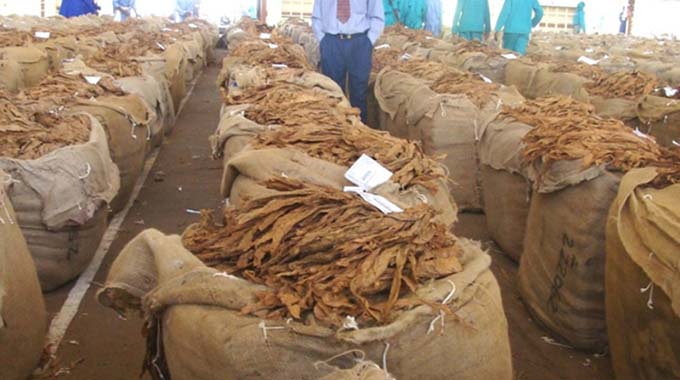Merchants to recover 30pc of tobacco loans

Golden Sibanda and Africa Moyo
The Reserve Bank of Zimbabwe says merchants who used offshore funds to support tobacco production are required to use a split ratio of 70 percent US dollar and 30 percent RTGS$ when recovering loans extended to farmers.
This policy position is contained in an exchange control directive, circular number of 2019 issued by the central bank, dated March 27, 2019.
The circular also contains several other directives on the treatment of foreign currency in the country.
According to the circular signed by RBZ exchange control director Farai Masendu, merchants are permitted to borrow funds offshore for purposes of financing production of Zimbabwe’s second largest foreign currency earner, after gold.
Official figures showed that by end of last year Zimbabwe had earned about $892 million from the export of 184,1 million kilogrammes of the golden leaf.
“In order to recover funds advanced to tobacco growers, tobacco merchants shall use a split of 70 percent USD and 30 percent RTGS$.
“This applies only to merchants who financed tobacco production using offshore financing,” he said.
Before the split, merchants will need to show proof that they drew down offshore funds, imported inputs, liquidated 20 percent of offshore funds to finance tobacco and furnish acknowledgement of receipt of inputs or working capital by growers.
Where merchants claim to have lost value as a result of the 70-30 percent split, the central bank will require the claimant to show proof of this to settle the matter.
The Reserve Bank also says farmers will be paid 50 percent of their foreign currency entitlement for tobacco sales after deduction of statutory payments, prescribed costs and input loans.
Meanwhile, the central bank has issued exchange control guidelines on the treatment of foreign currency receipts by holders of free funds, which have no time limit for usage.
Individuals selling goods and services to entities that receive offshore funds, such as embassies, non-governmental and international organisations, are required to keep such funds in domestic foreign currency accounts (FCAs).
Similarly, foreign currency payments to hospital or health institutions by non-residents, and retail shops shall be kept in a nostro foreign currency account of the recipient.
The RBZ said donations and grants shall also be treated as free funds and not subjected to the 30-day retention period before being sold on the interbank market.
Free funds will also not be subjected to retention thresholds.
Further, monetary authorities said in the circular that insurance premiums denominated in foreign currency and paid by non-residents shall be deposited into nostro FCA (transitory) account of the respective insurance company.
The reserve bank also said operation of nostro FAC (transitory) accounts for insurance premiums shall require prior specific exchange control approvals.
On tourism receipts, the RBZ said that the 20 percent foreign currency surrender portion due to it from payments through international Visa Card and MasterCard maybe remitted as bullet transactions on a monthly basis.
Farmers have so far sold 538 147 kilogrammes of tobacco worth US$896 166 since the tobacco marketing season commenced a fortnight ago compared to 6,8 million kg worth US$19 million sold over the same period last year.
This year’s tobacco selling season started on a low note as tobacco farmers withheld their crop while protesting low prices and the 2 percent intermediated money transfer tax, which the Government has since scrapped.










Comments